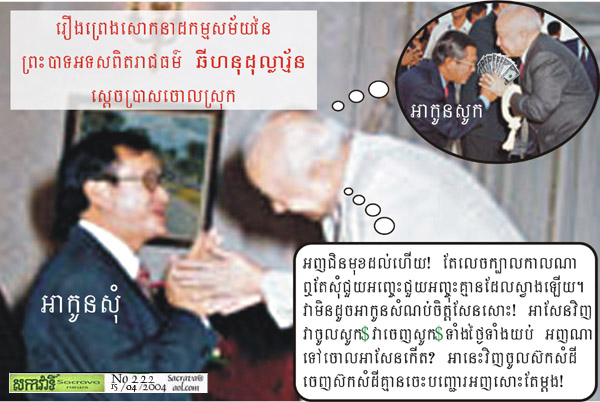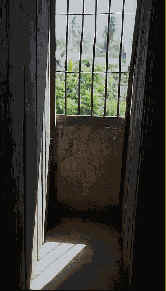
A
C
R
A
V
A
fillingfilling
N
E
W
S
| LES 6 COMMANDEMENTS |
COURRI@L 2004 | THE 6 COMMANDMENTS |
 |
A C R A V A fillingfilling N E W S |
|
.... and this is |
 |
|
Asia Times Online : A not-so-fine line exists between foreign support to foster democratization and the direct funding of a single political party. The first type of democracy promotion helps create a level playing field for governing and opposition parties alike; the second undermines democracy by interfering in the process from afar. In Cambodia, the International Republican Institute (IRI) has crossed far over this line in its support of the Sam Rainsy Party (SRP). Cambodia has three major political parties. In addition to the opposition SRP, the other leading political parties are the post-communist Cambodian People's Party (CPP), led by Hun Sen, and the royalist Funcinpec party under Prince Ranariddh. These latter two have uneasily shared power for the past decade. Meanwhile, the nationalistic SRP, named after its leader, has risen in the polls. The most recent elections, last July, saw the CPP win a majority of seats in the National Assembly but less than the two-thirds required by Cambodia's constitution to form a government. Funcinpec narrowly out polled the SRP for second place.
On the whole, US policy supported the electoral process in a neutral fashion. The US Embassy in Phnom Penh funded long-term election observers in many Cambodian provinces. Several other US government-funded agencies, including the Asia Foundation and the National Democratic Institute (NDI), sponsored non-partisan debates, distributed voter guides and funded domestic election monitors. IRI, by contrast, channeled its funding and technical assistance to the SRP, which it refers to as "the democratic opposition". Rainsy has repeatedly been guest of honor at IRI events in Washington, such as a banquet last April co-hosted by the Heritage Foundation. In October 2002, IRI channeled a US$450,000 grant from the US Agency for International Development (USAID) to start the Cambodian Center for Human Rights (CCHR), a non-governmental organization led by a former Funcinpec senator, Kem Sokha. Cambodia already has a number of respected, neutral human-rights organizations, but CCHR operates in "partnership" with IRI and provides reporting of rights abuses that are of particular political utility. When CCHR allegations of pre-election violence differed from that of other organizations, for instance, IRI routinely quoted CCHR's reports. Conveniently, the CCHR expatriate adviser is married to the IRI country director.
IRI's support for Sam Rainsy is accompanied by its visceral hatred of Prime Minister Hun Sen. This animosity dates back to a 1997 grenade attack on an SRP rally in which 13 Cambodians were killed and an IRI operative, Ron Abney, was injured. Cambodia's lackadaisical and corrupt judicial system never arrested any suspects, but IRI and Abney say they are "confident" that Hun Sen was himself responsible. IRI statements repeatedly call for further investigation of the attack while leaving no doubt about who they believe is to blame. IRI's vendetta is supported by key Republican leaders in the US Congress, most vehemently by Mitch McConnell of Kentucky, who is majority whip and chair of the Senate's Foreign Operations Subcommittee. McConnell's chief of staff, Paul Grove, is a former IRI representative in Cambodia and Asia director at IRI in Washington. In one extraordinary series of op-ed articles published in 2002 and early 2003, McConnell and Grove wrote, "It is in America's interests that the opposition win ... it is time for the State Department to take sides." This was followed by calls for "regime change" and attempts to link the "paranoid evil dictator" Hun Sen to the "war on terrorism".
In an Asian Wall Street Journal op-ed last May 20, McConnell argued directly that "technical and material assistance should be provided to opposition political parties", of which there is only one of any serious stature. In a May 22 letter to Senator McConnell, the Sam Rainsy Party-USA stated: "We understand that the political clout your office can bring to bear on the ruling party in times of crisis is paramount to our success. For the partnership forged between SRP and your office, it will play a pivotal role in safeguarding the livelihood of our party." On June 26, McConnell and two colleagues introduced the "Cambodia Democracy and Accountability Act" (S 1365), which provides for resuming full foreign assistance to Cambodia - provided that elections are "free and fair" - and "that Prime Minister Hun Sen is no longer in power". In effect, McConnell proposed using $21.5 million of US government aid to reward, if not to buy, a certain election result. The bill was relegated to committee and never acted on. However, the 2004 Consolidated Appropriations Act (HR 2673) contains "up to $4 million ... for activities to support democracy [in Cambodia], including assistance for democratic political parties".
In an interview last July with the Australian Broadcasting Corp, IRI's Asia director, Daniel Calingaert, said, "We've provided some additional assistance to the Sam Rainsy Party because they are at a disadvantage in that they are not in the ruling coalition and don't have the access to state resources that the other parties have." Calingaert refused, however, to reveal the exact amount of IRI support for the SRP. On election day in July, SRP activists in rural villages proudly displayed IRI notebooks and T-shirts, leaving no doubt about their funding source. The IRI election observer delegation was led by Christine Todd Whitman, who had recently stepped down as chief of the US Environmental Protection Agency (EPA). At a post-election press conference, Whitman and IRI's president, George Fulsom, expressed caution about broad generalizations about the outcome and denied that IRI had partisan favorites. Whitman later admitted that the results were "relatively free of irregularities" with "more open expression of political opinion and lively campaigns". Nevertheless, they concluded that the elections "did not meet international standards" - a statement that IRI has since used as justification for its partisan political operations in Cambodia and for its condemnations of the Hun Sen government. (...) [By Andrew Wells-Dang]
(Andrew Wells-Dang is the Indochina representative of the Fund for Reconciliation and Development, an independent non-profit organization supporting normal political, economic and cultural relations between the US and Cambodia, Laos, Vietnam and Cuba. He served as an official observer during the 1998 and 2003 Cambodian elections. This article is posted with permission from the Interhemispheric Resource Center.)
N.P. : SRP and Funcinpec are royalist. Their goal of democracy is yet to be proven. A large part of American Republican help should go to real Cambodian Republicans. The too many isolated parties and persons who want a "Republic of Cambodia" should rally in a "Alliance of Republicans" ready for the 2008 elections.
17 avril 1975 , Lest We Forget |
 |
 |
| LES SIX COMMANDEMENTS |
REFORMING OUR BUDDHISM |
ROMAN POLITIQUE |
DIEU vs BOUDDHA |
GRAMMAR Introduction |
COURRI@L 2004 (Previous) |